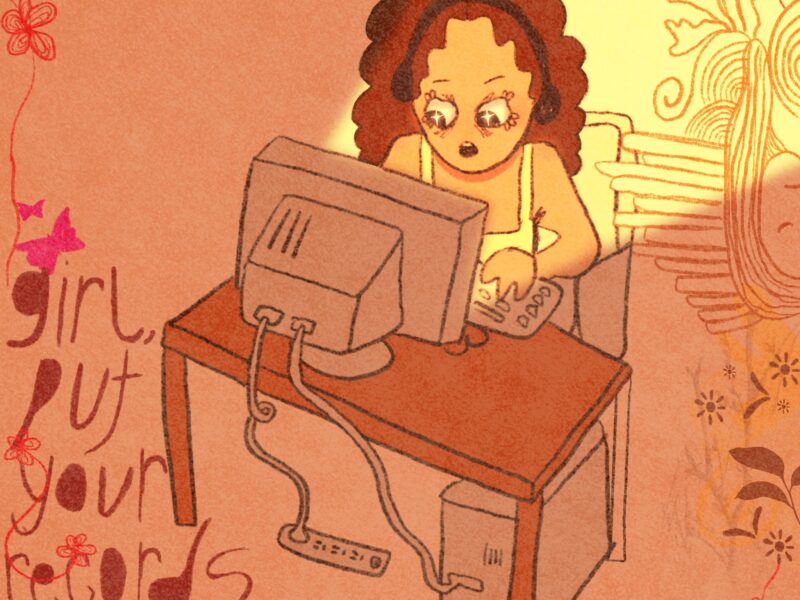The importance of understanding and respecting the cultural origins of the music I play as a white jazz pianist
My first exposure to music education came from a severely underfunded elementary school program held in a stuffy, oversized storage space. The room packed 25 children, shoulder to shoulder, into its cramped interior and was clearly not intended for academic instruction. We could barely rotate our tiny bodies, let alone interact with any instruments. The teacher, whose yellow-tinted upper lip introduced me to the phrase “smoker’s mustache,” was not paid enough, which may have accounted for his disinterested drawl and lackadaisical attempts to engage with his students. I liked the way he played his piano, but this teacher and his class didn’t give me much of an opportunity to discover a passion for music.
Instead, I learned to love music in the second-floor hallway of a duplex just down the street from my dad’s house. It was just as stuffy and compact as my school’s music classroom. But this space had a lively, welcoming air to it, fostered by the sweet sound of a muffled acoustic grand piano coming from the third door from the stairs on the right. Behind this door was the classroom of Mr. Duncan, a Black Motown native, my first true music instructor. I made sure to come to my lessons at least 10 minutes before they started to catch Mr. Duncan as he played his piano alone in his studio. With my head pressed against the classroom door, I would listen closely and muse. It was through these solitary performances that I got to know Mr. Duncan. His mood was immediately apparent in his choice of song and his improvisational flair, and in listening to his raw, emotional display, I developed a longing to express myself, as effortlessly as he, at the piano.
Mr. Duncan was, and still is, part of the teaching staff at Walker West Music Academy, a music school located in the historic, predominantly Black “Rondo” neighborhood of St. Paul. The founders of the school, Reverend Carl Walker and Grant West, created it to provide affordable access to music education for children, and adults, who otherwise lacked this opportunity, knowing and believing in the power of music to support the cognitive and social development of the youth. What’s more, jazz, gospel, and other styles of Black improvisational music were made to be the core elements of their program. They wanted to preserve the notion that the study of music is the study of culture and of history, passing this idea along to all of their students, no matter their cultural background.
I was a white boy listening at that door. I still am. But I was welcomed into the Walker West community with open arms, and Mr. Duncan did not hold back in assigning me any and all varieties of music to play. His curriculum balanced the classical cannon with jazz, soul, and gospel, as I learned pieces from both Rachmaninov and Monk, Bach and Bill Evans. Despite the fact that I was the son of two parents teetering between atheism and agnosticism, Mr. Duncan had me passionately performing gospel hymns such as “I Love the Lord” and “He is Wonderful” for recital halls full of dedicated parishioners. He accompanied me in my performance of Herbie Hancock’s, “Cantaloupe Island,” he on the Hammond B3 organ and me on the Yamaha grand, as audience members, riled up by our soulful display, shouted out praises, making the space feel like a Baptist church service that I was leading. In that moment, and others to follow, I was able to perform with authenticity at Walker West even as a white kid because his instruction drove home the historical, cultural, and personal significance of the music I played. In a conversation we had recently, Mr. Duncan explained his approach to teaching, “Whenever I am teaching music, I am gonna teach you more than just how to play. I want you to understand what you’re playing and how it makes sense to you,” Mr. Duncan said. “And it’s more than just a scale, that’s just part of some rudiments, but I think about the individual person: How does this make you feel?”
But as I grew older, the reality of race emerged. I was a white musician playing and studying Black music. Although I had never considered my whiteness as an obstacle to playing the music I loved, a history of white appropriation and discrimination in jazz, and many other forms of music, made me wary of perpetuating this cultural violation. On top of this, outside of Walker West, jazz bands in high schools and colleges in Minnesota, I realized, were predominantly white and higher level jazz education on a national scale was dominated by white students. According to statistics from the Department of Education, of the nearly 500 students who graduate from universities in the US with jazz degrees each year, less than 10 percent are Black. In coming to terms with these disparities, I began to question my worthiness as a player of jazz. Why should I, a white kid, have the opportunity to play this Black cultural music when so many other Black children lack access?
There are no easy answers to this question. But in the face of these injustices, there are ways to proceed respectfully as a white musician playing Black music. I cannot change the history of discrimination against Black creators, but I can give credit where it is due. Growing up at Walker West was a privilege, and it conditioned me to have a kind of reverence for the pioneers of the music I play, to realize that these musical art forms are undoubtedly derivative of the Black-American experience and that I am a lucky beneficiary of the music this experience produced. Not only is this cultural consciousness ethical, but it is beneficial to one’s musicianship, because listening and researching is half the battle to becoming a more dynamic, well-rounded player. So, as a white jazz musician in the 21st century, I do have things to contribute to this art form, but I must be thoughtful and deferential as I do so. I am a performer yes, but first and foremost I am a student. That will never change.



